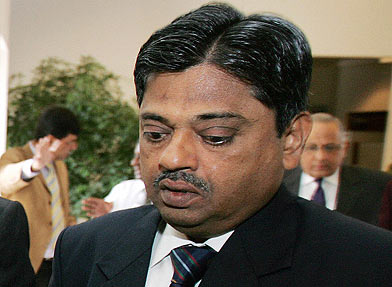A day after backing the players in rejecting the World Anti-Doping Agency's (WADA) controversial 'whereabouts clause', the Indian cricket board on Monday made efforts to show that it was serious about controlling the use of banned substances in the sport.
The BCCI is now set to chart out its own anti-doping measures for domestic cricketers, while proposing that the ICC adopt a "cricket-specific" anti-doping code that will take into consideration only the duration of the international cricket season, rather than WADA's all-year-round stipulations.

BCCI's chief administrative officer Ratnakar Shetty told The Indian Express that these dope tests on domestic players would commence from next year. "This year, the BCCI will first educate every association about dope testing. We can't just issue templates of WADA and expect them to read it. The language used by WADA is difficult to understand, so we'll be hiring experts to give lectures on this. We want associations and players to understand why this thing is important in today's sport," Shetty said.
Earlier this year, the ICC had circulated a template of the anti-doping code for all of its members to adopt in order to help them govern anti-doping matters at a domestic level in a manner that will be consistent with WADA's code-compliance.
Educating players
The BCCI said it would spend two months in the education phase — with sessions with players, doctors, coaches, physiotherapists and trainers — explaining the pros and cons of the use of medicines in modern sport. "Many cricketers at the domestic level don't have knowledge of all these doping activities. We will inform Ranji Trophy-level cricketers what it is all about," Shetty said.
Once the players have been explained the new dope-testing measures, the BCCI plans to start conducting random tests. If anyone is found guilty, the board itself will decide on the actions to be taken, rather than go to an outside agency.
As a result, several associations will now have to hire doctors and physios on either full-time basis or per-season basis, rather than the current system in which some of them are employed only for the duration of the Ranji Trophy.
"For the Indian team, if any player is prescribed any medicine by any doctor, they first contact physio Nitin Patel who clears the medicine and tells the player if it's okay to use it. The same will apply to Ranji Trophy players, who will have to ask their respective physios," Shetty said.
Seeking NADA help
But with no proper testing facilities of its own, the BCCI is hoping to seek the help of the National Anti-Doping Agency (NADA). "You need things like cold storages and many other things to preserve the samples. NADA is a subsidy of WADA and it comes under the Central Government. They are best to look into matters of testing," Shetty said.
The 'whereabouts clause' requires players to give their location on a quarterly basis and asks athletes to be available for one hour every day for random, out-of-competition tests. The Indian players have objected to the clause saying it was an invasion of privacy and a potential security threat.
Board officials have said that the sport did not require such an elaborate mechanism.
Asiad implication
As things stand, however, if the BCCI rejects the WADA stipulations, it will not be able to be a part of multi-discipline events such as the Asian Games and the Olympics. Cricket will make its Asiad debut in the 2010 edition, to be held in Guangzhou, China.
The BCCI doesn't have an alternative, feels Randhir Singh, secretary-general of the Olympic Council of Asia (OCA). "The players must fall in line with the WADA clause," he said on Monday. "I am confident they (cricketers and BCCI) would adhere to the clause. The international body (ICC) recognises the code. They should look into the problem and solve it. In any case, we have more than a year to go for the Games," he added.
Randhir also felt that there was some kind of misunderstanding about the clause. "It is a simple clause and every sportsperson abides by it. Adherence to the WADA regulation has become even more important with the sport offering medals in the Games."
